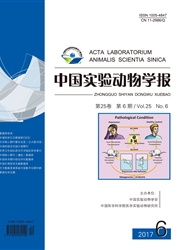

 中文摘要:
中文摘要:
阿尔茨海默病是由β淀粉样蛋白造成的人类神经损伤性痴呆病之一,目前尚无治疗办法。朊蛋白是β淀粉样蛋白的受体,是阿尔茨海默病发病过程的关键蛋白之一,具有传递神经毒性和保护神经细胞的双重作用。人朊蛋白编码基因(PNRP)多态性影响阿尔茨海默病的潜伏期和临床症状,而PRNP突变体小鼠的发现提升了动物模型在朊蛋白疾病研究中的应用价值,在一定程度上弥补了现有阿尔茨海默病动物模型的不足。本文总结了朊蛋白在阿尔茨海默病病理中的作用及PRNP突变对阿尔茨海默病的影响,并详细总结了PRNP突变体小鼠的发现及在蛋白沉淀样病变研究中的应用和价值,旨在为阿尔茨海默病动物模型研究提供理论参考。
 英文摘要:
英文摘要:
Alzheimer's disease( AD) is one of the most common dementia of neurodegenerative disorders,which results from the deposition of amyloid-beta( Aβ) and there are no curative treatments for this disease at present. It had been proved that prion protein is the receptor for Aβ and it plays a key role in the progress of AD with dual-side effects.Prion protein can not only transfer neurotoxicity to neurons but also protect them from neurotoxicity of Aβ. The polymorphisms of prion protein encoding gene( PRNP) affect the AD incubation period and clinical symptoms in humans and other animals. The discovery of PRNP mutational mouse fills the gaps of existing AD mouse models in this research area,which is potential for the studies of pathogenesis,new drugs design and testing aspects. The role and effects of prion protein in AD pathogenesis were summarized in this paper,furthermore,the discovery and utility of PRNP gene mutational mouse in research on AD and/or amyloid diseases were reviewed,and in order to provide some guidance for AD animal model study.
 同期刊论文项目
同期刊论文项目
 同项目期刊论文
同项目期刊论文
 期刊信息
期刊信息
